
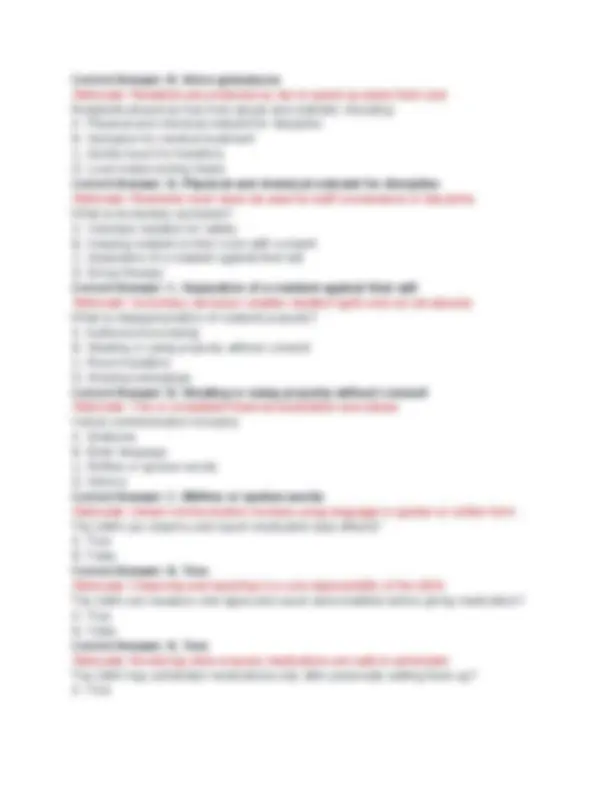
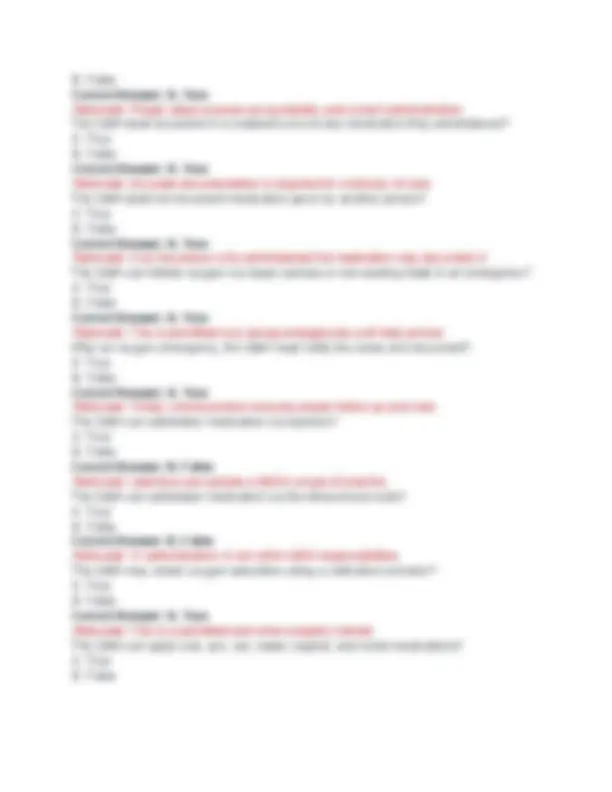
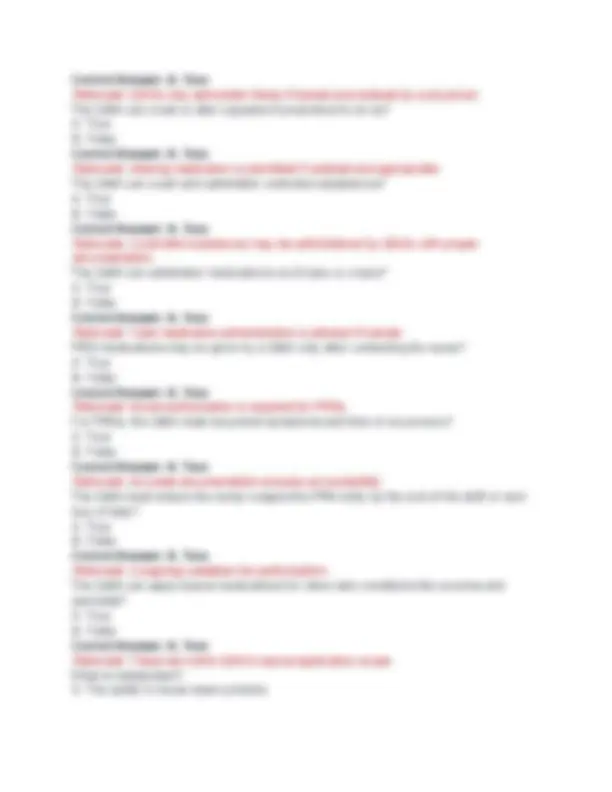
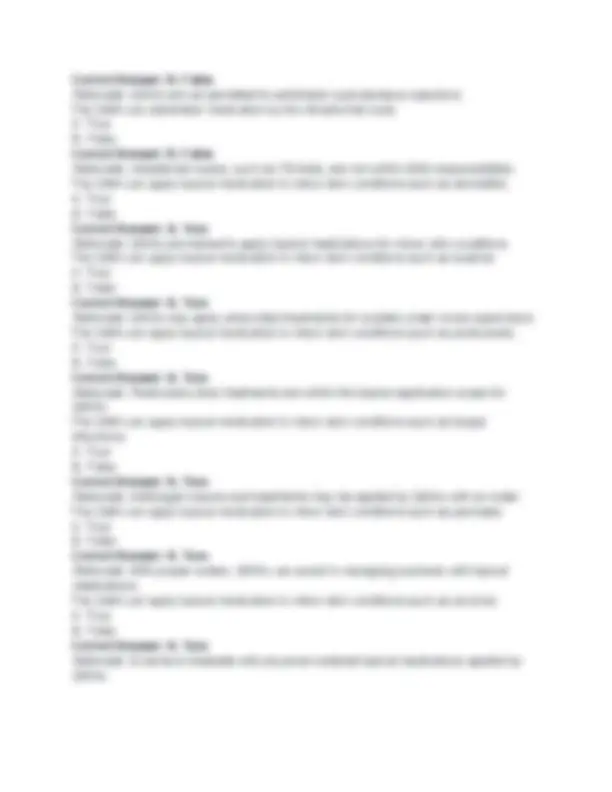
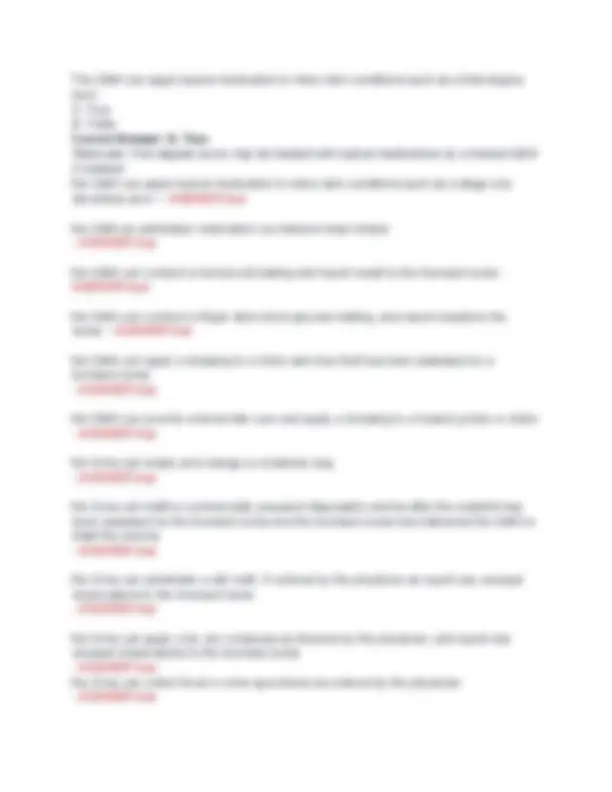
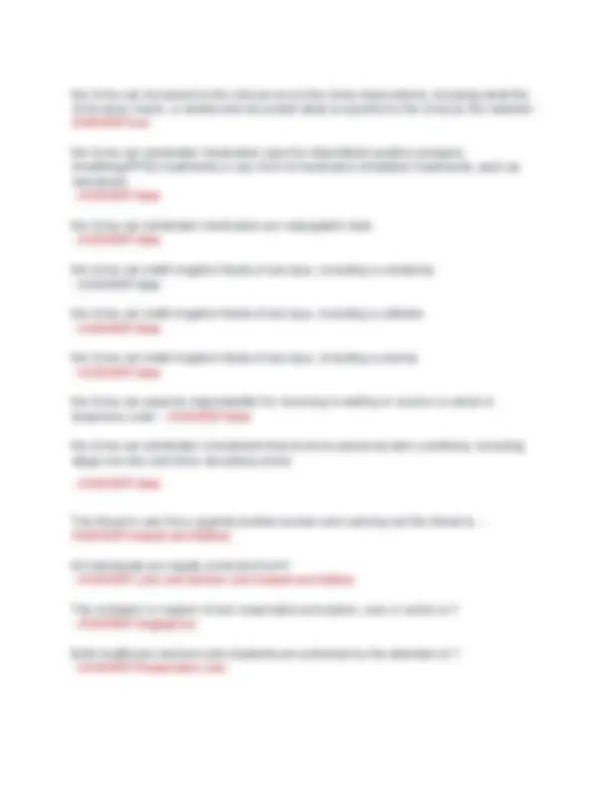
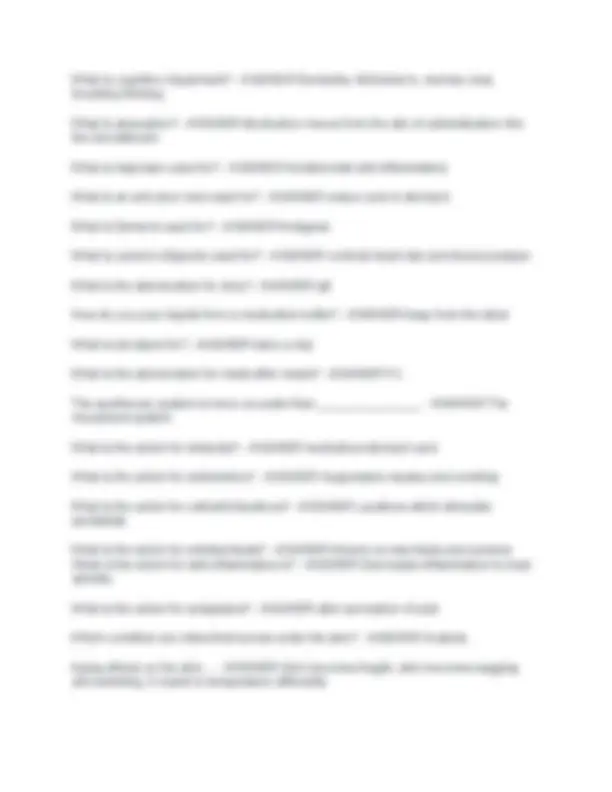
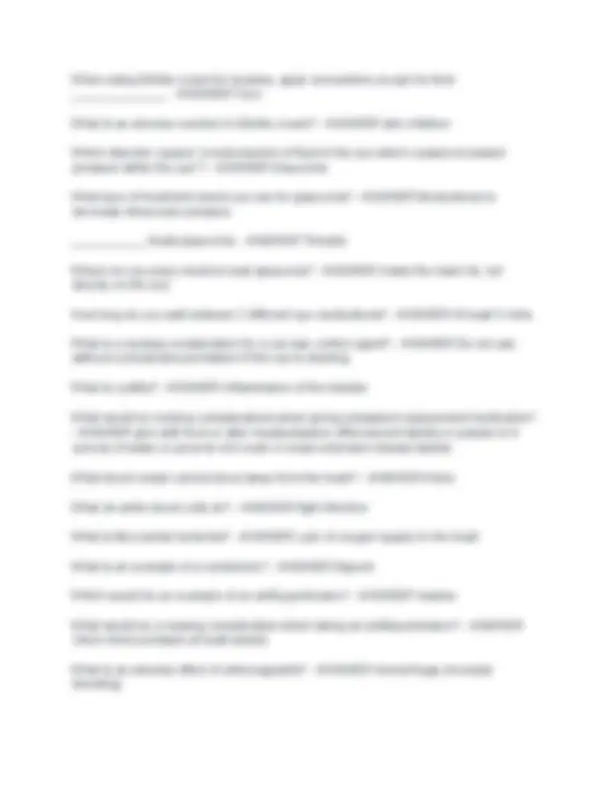
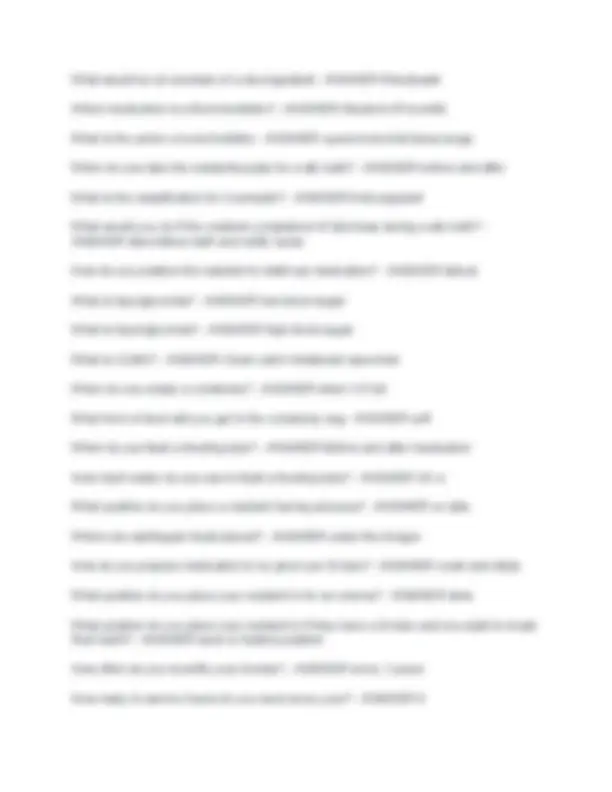
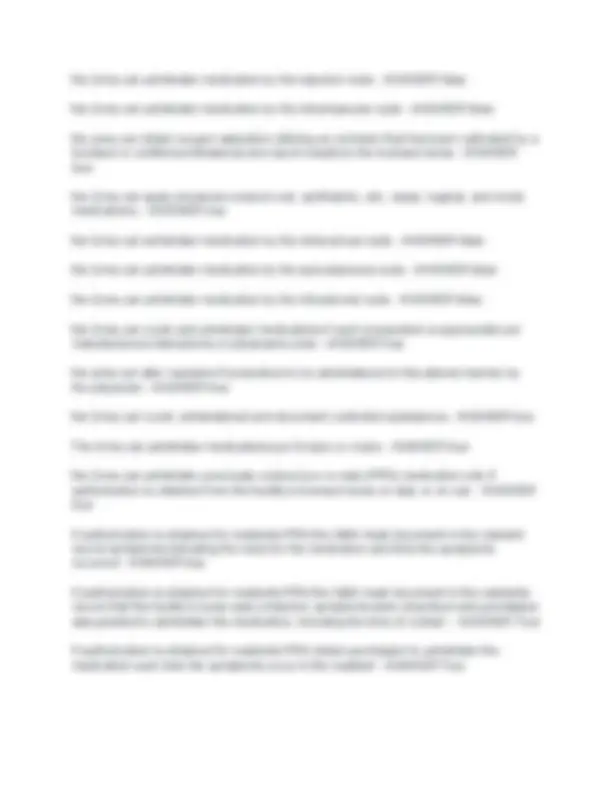
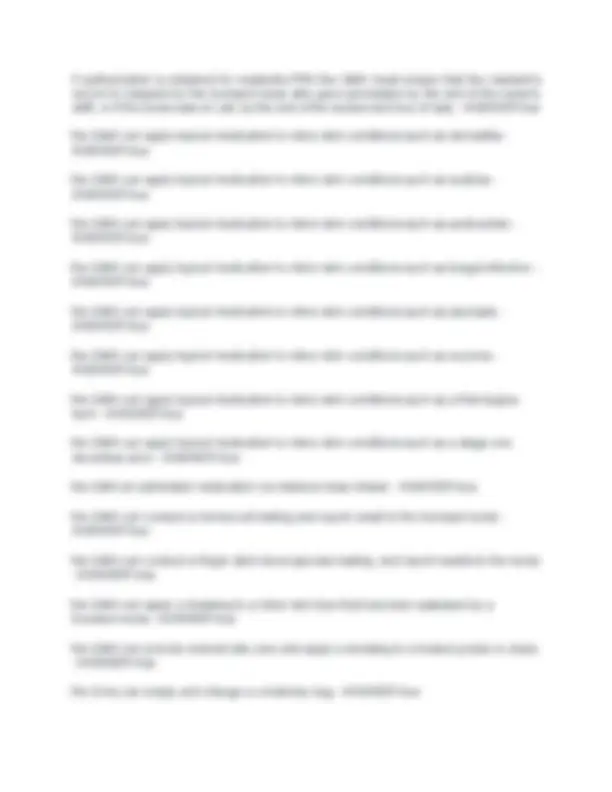
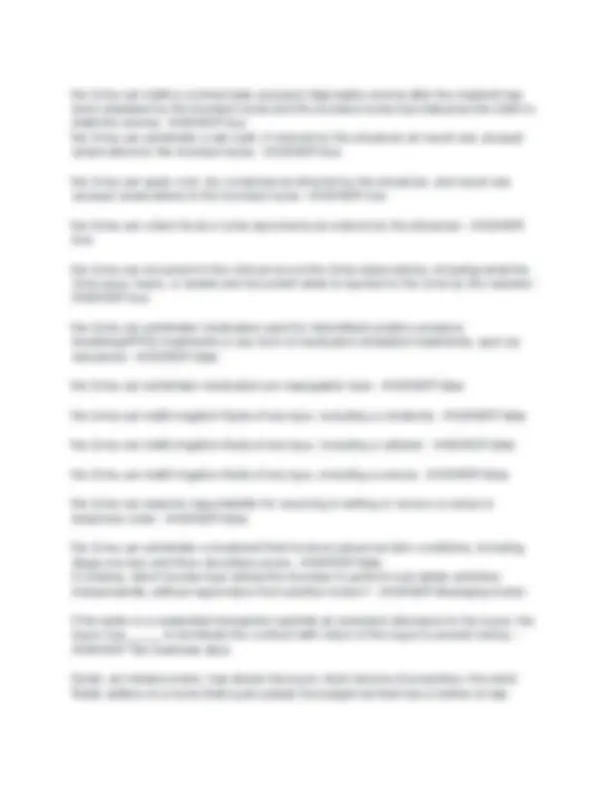
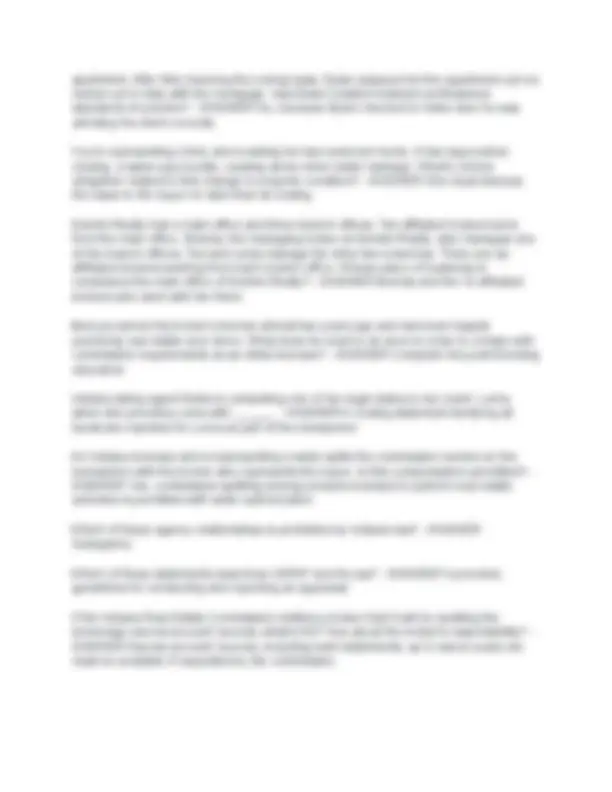
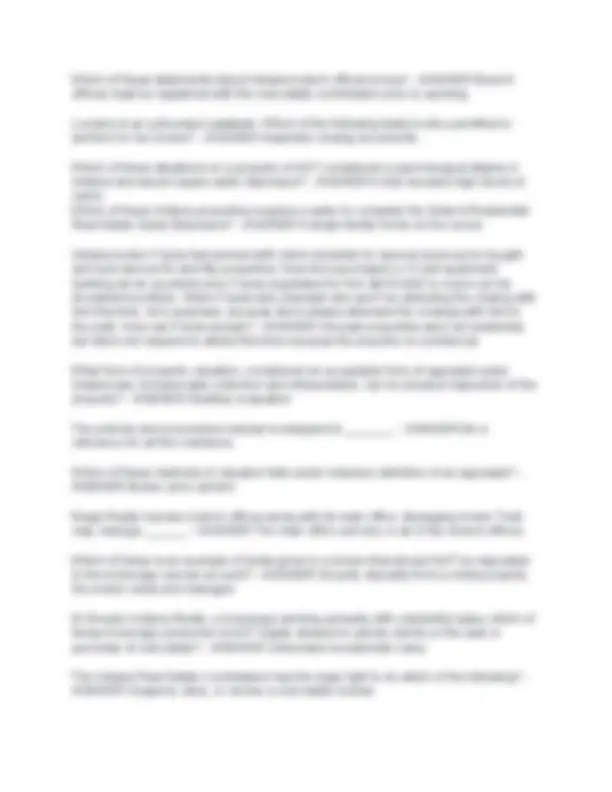
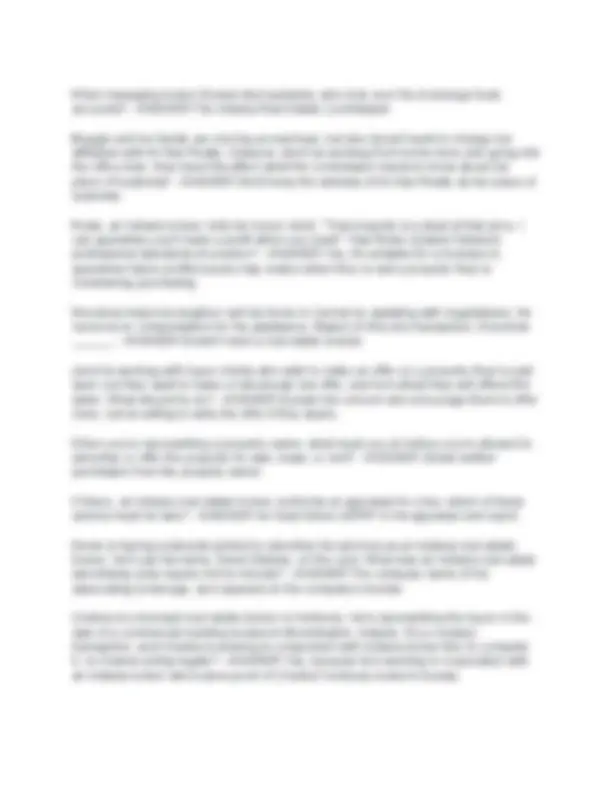
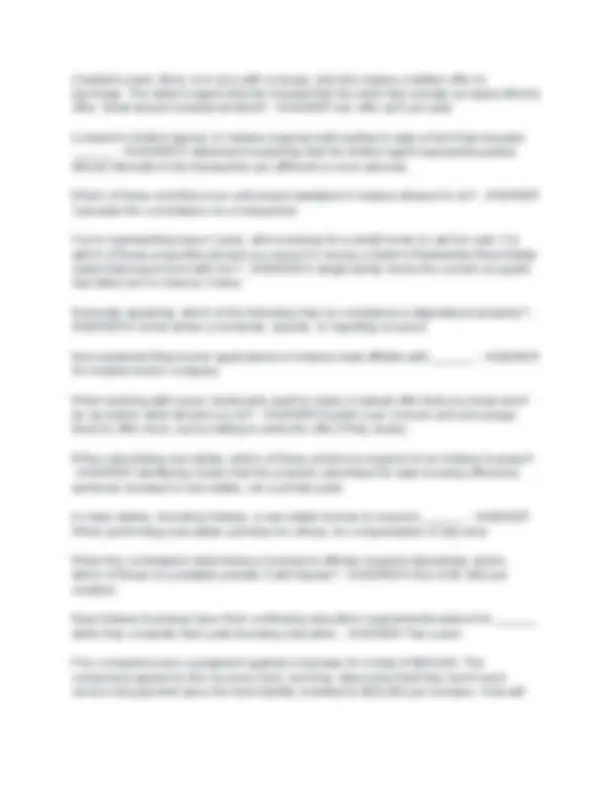
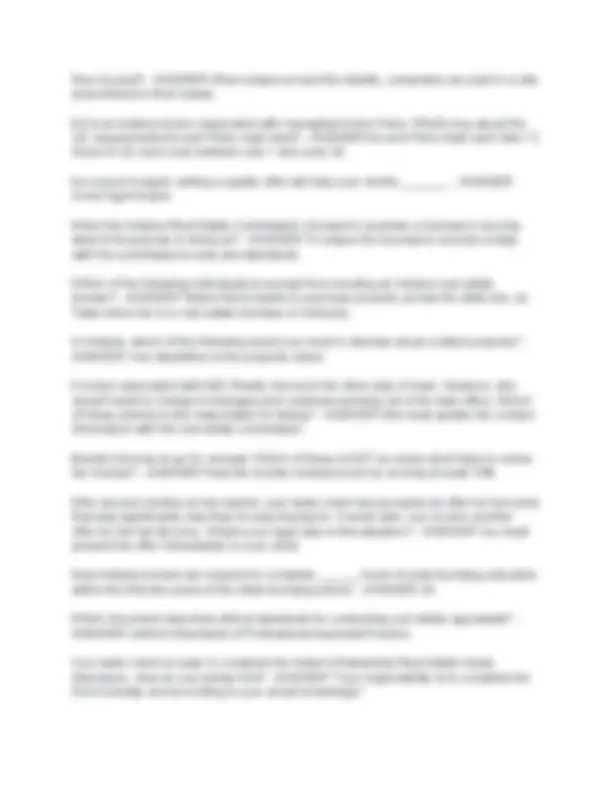
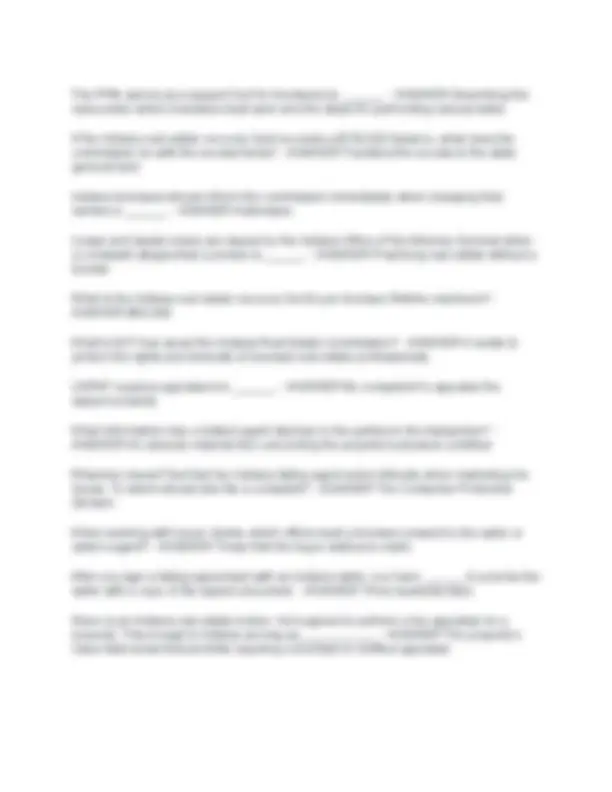
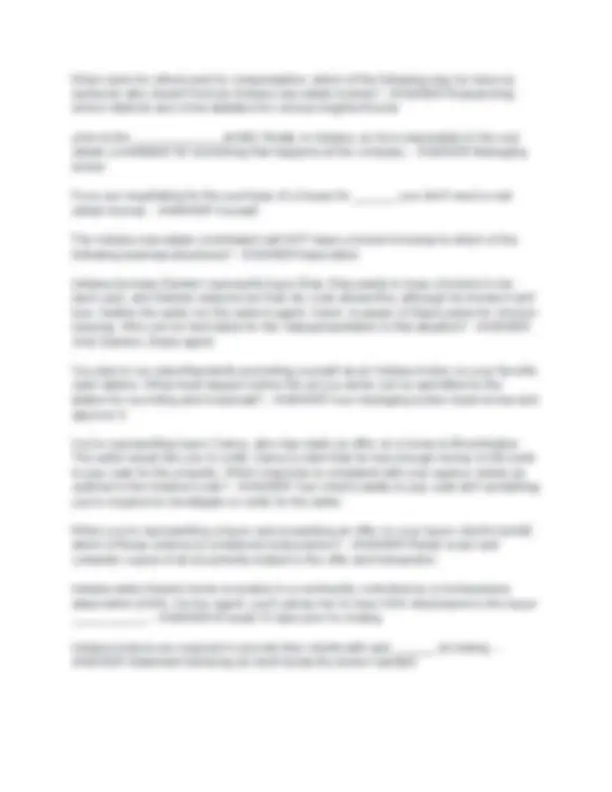
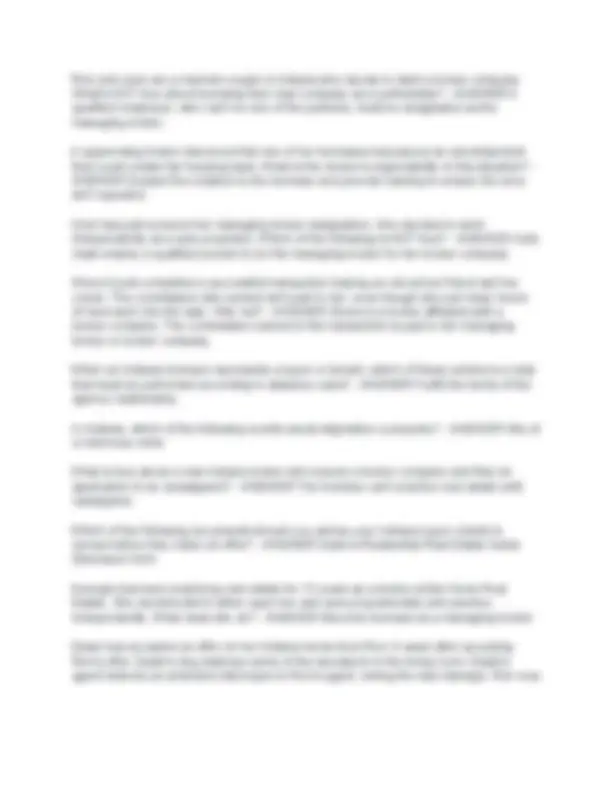
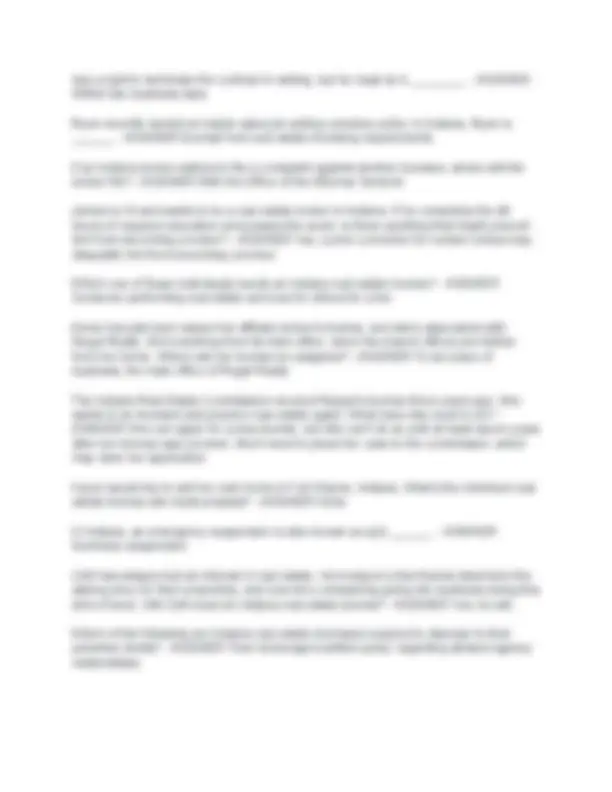
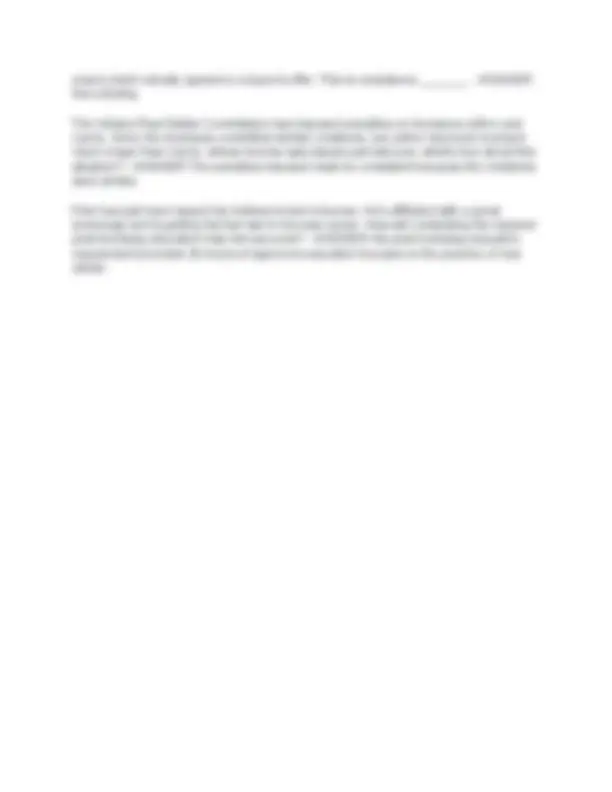


Study with the several resources on Docsity

Earn points by helping other students or get them with a premium plan


Prepare for your exams
Study with the several resources on Docsity

Earn points to download
Earn points by helping other students or get them with a premium plan
Community
Ask the community for help and clear up your study doubts
Discover the best universities in your country according to Docsity users
Free resources
Download our free guides on studying techniques, anxiety management strategies, and thesis advice from Docsity tutors
What is the first thing to do if you make or discover a medication error? A. Ignore it B. Correct it yourself C. Report it to the nurse D. Wait to see if there are symptoms Correct Answer: C. Report it to the nurse Rationale: Reporting medication errors promptly is crucial to ensure appropriate actions are taken to protect the patient. The nurse will likely instruct you to assist in observing the resident for: A. Hunger B. Adverse effects C. Activity level D. Sleep quality Correct Answer: B. Adverse effects Rationale: After a medication error, monitoring for adverse reactions is essential to manage any potential harm. Which form is completed by the person most familiar with the medication error situation? A. Incident Report B. Physician's Order C. Medication Error Report D. Nurse's Note Correct Answer: C.
Typology: Exams
1 / 30

This page cannot be seen from the preview
Don't miss anything!























What is the first thing to do if you make or discover a medication error? A. Ignore it B. Correct it yourself C. Report it to the nurse D. Wait to see if there are symptoms Correct Answer: C. Report it to the nurse Rationale: Reporting medication errors promptly is crucial to ensure appropriate actions are taken to protect the patient. The nurse will likely instruct you to assist in observing the resident for: A. Hunger B. Adverse effects C. Activity level D. Sleep quality Correct Answer: B. Adverse effects Rationale: After a medication error, monitoring for adverse reactions is essential to manage any potential harm. Which form is completed by the person most familiar with the medication error situation? A. Incident Report B. Physician's Order C. Medication Error Report D. Nurse's Note Correct Answer: C. Medication Error Report Rationale: The Medication Error Report is typically completed by the individual who committed or discovered the error. What report is sent to the director of nursing or administrator? A. Shift report B. Medication Error Report C. Incident Summary D. Nurse's Log Correct Answer: B. Medication Error Report Rationale: This report formally documents medication errors for administrative and quality control review.
Who reviews medication error reports? A. Pharmacy technician and nurse aide B. Charge nurse and CNA C. Medical director and Director of Nursing (DON) D. Resident and family Correct Answer: C. Medical director and Director of Nursing (DON) Rationale: These individuals are responsible for reviewing errors and creating plans to prevent recurrence. Personal information, medical records, written and verbal communications, and behavior fall under a patient's: A. Autonomy B. Confidentiality C. Responsibility D. Health directive Correct Answer: B. Confidentiality Rationale: Confidentiality ensures patient information is kept private and secure. What should you give the patient and their property? A. Independence B. Freedom C. Privacy D. Supervision Correct Answer: C. Privacy Rationale: Patients and their belongings must be treated with respect and kept private. You must be _____ of a patient’s personal and medical information. A. respectful B. protective C. informed D. unaware Correct Answer: C. Informed Rationale: Being informed allows for safe and appropriate care of the resident. Residents have the right to: A. Be isolated from others B. Decline personal physicians C. Choose activities and refuse treatment D. Have no say in care planning Correct Answer: C. Choose activities and refuse treatment Rationale: Resident rights include autonomy in care and lifestyle choices. Patients can _____ about services without fear of retaliation. A. vote B. voice grievances C. file lawsuits D. leave
B. False Correct Answer: A. True Rationale: Proper setup ensures accountability and correct administration. The QMA shall document in a resident's record any medication they administered? A. True B. False Correct Answer: A. True Rationale: Accurate documentation is required for continuity of care. The QMA shall not document medication given by another person? A. True B. False Correct Answer: A. True Rationale: Only the person who administered the medication may document it. The QMA can initiate oxygen via nasal cannula or non-sealing mask in an emergency? A. True B. False Correct Answer: A. True Rationale: This is permitted only during emergencies until help arrives. After an oxygen emergency, the QMA must notify the nurse and document? A. True B. False Correct Answer: A. True Rationale: Timely communication ensures proper follow-up and care. The QMA can administer medication via injection? A. True B. False Correct Answer: B. False Rationale: Injections are outside a QMA’s scope of practice. The QMA can administer medication via the intravenous route? A. True B. False Correct Answer: B. False Rationale: IV administration is not within QMA responsibilities. The QMA may obtain oxygen saturation using a calibrated oximeter? A. True B. False Correct Answer: A. True Rationale: This is a permitted task when properly trained. The QMA can apply oral, eye, ear, nasal, vaginal, and rectal medications? A. True B. False
Correct Answer: A. True Rationale: QMAs may administer these if trained and ordered by a physician. The QMA can crush or alter capsules if prescribed to do so? A. True B. False Correct Answer: A. True Rationale: Altering medication is permitted if ordered and appropriate. The QMA can count and administer controlled substances? A. True B. False Correct Answer: A. True Rationale: Controlled substances may be administered by QMAs with proper documentation. The QMA can administer medications via G-tube or J-tube? A. True B. False Correct Answer: A. True Rationale: Tube medication administration is allowed if trained. PRN medications may be given by a QMA only after contacting the nurse? A. True B. False Correct Answer: A. True Rationale: Nurse authorization is required for PRNs. For PRNs, the QMA must document symptoms and time of occurrence? A. True B. False Correct Answer: A. True Rationale: Accurate documentation ensures accountability. The QMA must ensure the nurse cosigns the PRN entry by the end of the shift or next tour of duty? A. True B. False Correct Answer: A. True Rationale: Cosigning validates the authorization. The QMA can apply topical medications for minor skin conditions like eczema and psoriasis? A. True B. False Correct Answer: A. True Rationale: These are within QMA's topical application scope. What is metabolism? A. The ability to break down proteins
What is assault and battery? A. Harsh language B. Ignoring a patient C. A verbal threat that is carried out D. Rough handling Correct Answer: C. A verbal threat that is carried out Rationale: Assault and battery involve threat and follow-through action. Leaving a resident alone in the shower room or using broken equipment is: A. Abuse B. Negligence C. Battery D. Disrespect Correct Answer: B. Negligence Rationale: Negligence is failure to act with reasonable care. Medication errors can be caused by: A. Following protocol B. Taking breaks C. Lack of concentration or communication D. Proper training Correct Answer: C. Lack of concentration or communication Rationale: Most errors are linked to human or system mistakes. If you have a medication error, should you report it to the doctor immediately? A. True B. False Correct Answer: B. False Rationale: First report to the nurse, who may then contact the physician. Report all suspected abuse to the nurse: A. After your shift B. At the next meeting C. Immediately D. The next day Correct Answer: C. Immediately Rationale: Prompt reporting is essential to protect the resident The QMA can administer medication by the intramuscular route: A. True B. False Correct Answer: B. False Rationale: Intramuscular injections are outside the scope of practice for a QMA. The QMA can administer medication by the subcutaneous route: A. True B. False
Correct Answer: B. False Rationale: QMAs are not permitted to administer subcutaneous injections. The QMA can administer medication by the intradermal route: A. True B. False Correct Answer: B. False Rationale: Intradermal routes, such as TB tests, are not within QMA responsibilities. The QMA can apply topical medication to minor skin conditions such as dermatitis: A. True B. False Correct Answer: A. True Rationale: QMAs are trained to apply topical medications for minor skin conditions. The QMA can apply topical medication to minor skin conditions such as scabies: A. True B. False Correct Answer: A. True Rationale: QMAs may apply prescribed treatments for scabies under nurse supervision. The QMA can apply topical medication to minor skin conditions such as pediculosis: A. True B. False Correct Answer: A. True Rationale: Pediculosis (lice) treatments are within the topical application scope for QMAs. The QMA can apply topical medication to minor skin conditions such as fungal infections: A. True B. False Correct Answer: A. True Rationale: Antifungal creams and treatments may be applied by QMAs with an order. The QMA can apply topical medication to minor skin conditions such as psoriasis: A. True B. False Correct Answer: A. True Rationale: With proper orders, QMAs can assist in managing psoriasis with topical medications. The QMA can apply topical medication to minor skin conditions such as eczema: A. True B. False Correct Answer: A. True Rationale: Eczema is treatable with physician-ordered topical medications applied by QMAs.
the Qma can document in the clinical record the Qma observations, including what the Qma sees, hears, or smells and document what is reported to the Qma by the resident - ANSWER true the Qma can administer medication used for intermittent positive pressure breathing(IPPD) treatments or any form of medication inhalation treatments, such as nebulizers
right medication, right dose, right resident, right route, right time, and right documentation is?
What is cognitive impairment? - ANSWER Dementia, Alzheimer's, memory loss, troubling thinking What is absorption? - ANSWER Medication moves from the site of administration into the bloodstream What is Naprosyn used for? - ANSWER Nonsteroidal anti-inflammatory What is an anti ulcer med used for? - ANSWER reduce acid in stomach What is Demerol used for? - ANSWER Analgesic What is Lanoxin (Digoxin) used for? - ANSWER controls heart rate and blood pressure What is the abbreviation for drop? - ANSWER gtt How do you pour liquids from a medication bottle? - ANSWER Away from the label What is bid stand for? - ANSWER twice a day What is the abbreviation for meds after meals? - ANSWER PC The apothecary system is more accurate than _______________. - ANSWER The Household system What is the action for antacids? - ANSWER neutralizes stomach acid What is the action for antiemetics? - ANSWER Suppresses nausea and vomiting What is the action for cathartic/laxatives? - ANSWER Laxatives which stimulate peristalsis What is the action for antidiarrheals? - ANSWER Absorb excess fluids and bacteria What is the action for anti-inflammatory's? - ANSWER Decreases inflammation to treat arthritis What is the action for analgesics? - ANSWER alter perception of pain Which condition are mites that burrow under the skin? - ANSWER Scabies Aging effects on the skin.... - ANSWER Skin becomes fragile, skin becomes sagging and wrinkling, it reacts to temperature differently
When using Elimite cream for scabies, apply everywhere except for their ______________. - ANSWER Face What is an adverse reaction to Elimite cream? - ANSWER skin irritation Which disorder causes "overproduction of fluid in the eye which causes increased pressure within the eye"? - ANSWER Glaucoma What type of treatment would you use for glaucoma? - ANSWER Medications to decrease intraocular pressure ___________ treats glaucoma. - ANSWER Timoptic Where do you place meds to treat glaucoma? - ANSWER Inside the lower lid, not directly on the eye How long do you wait between 2 different eye medications? - ANSWER At least 5 mins What is a nursing consideration for a ear wax control agent? - ANSWER Do not use without a physicians permission if the ear is draining What is cystitis? - ANSWER inflammation of the bladder What would be nursing considerations when giving potassium replacement medication?
When do you change a colostomy bag? - ANSWER When it is leaking, 2x/wk at least, if it is red and irritated The threat to use force against another person and carrying out the threat is - ANSWER Assault and Battery All individuals are legally protected from? - ANSWER Libel and slander and Assault and battery The omission or neglect of any reasonable precaution, care or action is? - ANSWER Negligence Both healthcare workers and residents are protected by the standard of? - ANSWER Reasonable care right medication, right dose, right resident, right route, right time, and right documentation is? - ANSWER The six rights of medication administration The first thing to do if you make or discover a medication error is report it to the nurse is called - ANSWER Reporting the nurse will likely instruct you to assist to observe the resident for - ANSWER adverse effects This form is completed by whomever is the most familiar with the situation, usually the person who committed or discovered the error by following your facility policy. is called a ? - ANSWER Medication Error Report what report is sent to the director of nursing or administrator? - ANSWER medication error report medication error reports are reviewed by? - ANSWER medical director and the DON who design plans that will avoid future incidents. Personal information, medical records, written and verbal communications, medical treatment, personal care and behavior is a patients? - ANSWER Confidentially give the patient and their property? - ANSWER privacy you must be _____ of a patients personal and medical information - ANSWER be informed
residents have the ____ to refuse treatment, self-administering medications, choosing personal physician, participating in care planning, having visitors, maintaining personal possessions, and participating in activities in and out of the facility. - ANSWER Choice patients can _____ about services without fear of retaliation - ANSWER voice grievances residents should be free from & including physical and chemical restraint for discipline or convenience, verbal,mental, or physical abuse, corporal punishment for seclusion. - ANSWER freedom from abuse and restraint separation of a resident from other residents or from his/her room or confinement to his/her room against the residents will or will of the residents legal representative - ANSWER involuntary seclusion. deliberate misplacement, exploitation or wrongful, temporary or placement use of a residents belongings or money without the residents consent - ANSWER misappropriation of resident property verbal communication is - ANSWER written or spoken words the Qma can observe and report to the facility's nurse reactions and side effects to medications exhibited by a resident? - ANSWER true the Qma can measure and document vital signs prior to the administration of medication that could affect or change the vital signs, report any abnormalities to the licensed nurse that would prohibit medication administration. - ANSWER true the Qma can administer regularly prescribed medication which the Qma has been trained to administer only after personally preparing(setting up) the medication to be administered - ANSWER true the Qma shall document in a residents clinical record any medication that the Qma personally administered - ANSWER true The Qma shall not document in a residents clinical record any medication that was administered by another person or not administered at all. - ANSWER true the Qma can initiate oxygen per nasal cannula or non-sealing mask only in an emergency. - ANSWER true After the emergency the Qma shall verbally notify licensed nurse on duty or on call and appropriately document the action and notification - ANSWER true
If authorization is obtained for residents PRN the QMA must ensure that the resident's record is cosigned by the licensed nurse who gave permission by the end of the nurse's shift, or if the nurse was on call, by the end of the nurses next tour of duty - ANSWER true the QMA can apply topical medication to minor skin conditions such as dermatitis - ANSWER true the QMA can apply topical medication to minor skin conditions such as scabies - ANSWER true the QMA can apply topical medication to minor skin conditions such as pediculosis - ANSWER true the QMA can apply topical medication to minor skin conditions such as fungal-infection - ANSWER true the QMA can apply topical medication to minor skin conditions such as psoriasis - ANSWER true the QMA can apply topical medication to minor skin conditions such as eczema - ANSWER true the QMA can apply topical medication to minor skin conditions such as a first degree burn - ANSWER true the QMA can apply topical medication to minor skin conditions such as a stage one decubitus ulcer - ANSWER true the QMA an administer medication via metered dose inhaler - ANSWER true the QMA can conduct a hemoccult testing and report result to the licensed nurse - ANSWER true the QMA can conduct a finger stick blood glucose testing, and report results to the nurse
the Qma can instill a commercially prepared disposable enema after the resident has been assessed by the licensed nurse and the licensed nurse has instructed the QMA to instill the enema - ANSWER true the Qma can administer a sitz bath, if ordered by the physician an report any unusual observations to the licensed nurse - ANSWER true the Qma can apply cold, dry compress as directed by the physician, and report any unusual observations to the licensed nurse - ANSWER true the Qma can collect fecal or urine specimens as ordered by the physician - ANSWER true the Qma can document in the clinical record the Qma observations, including what the Qma sees, hears, or smells and document what is reported to the Qma by the resident - ANSWER true the Qma can administer medication used for intermittent positive pressure breathing(IPPD) treatments or any form of medication inhalation treatments, such as nebulizers - ANSWER false the Qma can administer medication per nasogastric tube - ANSWER false the Qma can instill irrigation fluids of any type, including a colostomy - ANSWER false the Qma can instill irrigation fluids of any type, including a catheter - ANSWER false the Qma can instill irrigation fluids of any type, including a enema - ANSWER false the Qma can assume responsibility for receiving in writing or receive a verbal or telephone order - ANSWER false the Qma can administer a treatment that involves advanced skin conditions, including stage one two and three decubitus ulcers - ANSWER false In Indiana, which license type allows the licensee to perform real estate activities independently, without supervision from another broker? - ANSWER Managing broker If the seller in a residential transaction submits an amended disclosure to the buyer, the buyer has _____ to terminate the contract with return of the buyer's earnest money. - ANSWER Two business days Dylan, an Indiana broker, has shown his buyer client dozens of properties. His client finally settles on a home that's just outside his budget but that has a mother-in-law